The-Boy-and-the-Bank-Officer (1)
Unit-2-现代大学英语精读第一册The-Boy-and-the-Bank-Officer答案
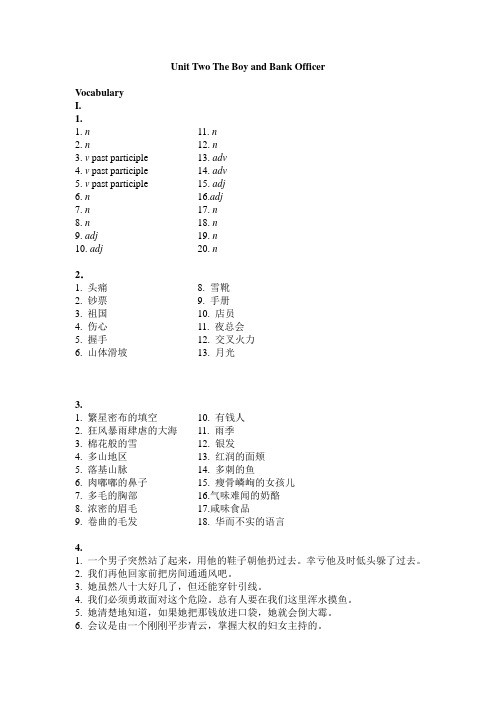
Unit Two The Boy and Bank OfficerVocabularyI.1.1. n11. n2. n12. n3. v past participle 13. adv4. v past participle 14. adv5. v past participle 15. adj6. n16.adj7. n 17. n8. n18. n9. adj 19. n10. adj 20. n2.1. 头痛8. 雪靴2. 钞票9. 手册3. 祖国10. 店员4. 伤心11. 夜总会5. 握手12. 交叉火力6. 山体滑坡13. 月光3.1. 繁星密布的填空10. 有钱人2. 狂风暴雨肆虐的大海11. 雨季3. 棉花般的雪12. 银发4. 多山地区13. 红润的面颊5. 落基山脉14. 多刺的鱼6. 肉嘟嘟的鼻子15. 瘦骨嶙峋的女孩儿7. 多毛的胸部16.气味难闻的奶酪8. 浓密的眉毛17.咸味食品9. 卷曲的毛发18. 华而不实的语言4.1. 一个男子突然站了起来,用他的鞋子朝他扔过去。
幸亏他及时低头躲了过去。
2. 我们再他回家前把房间通通风吧。
3. 她虽然八十大好几了,但还能穿针引线。
4. 我们必须勇敢面对这个危险。
总有人要在我们这里浑水摸鱼。
5. 她清楚地知道,如果她把那钱放进口袋,她就会倒大霉。
6. 会议是由一个刚刚平步青云,掌握大权的妇女主持的。
7. 正如老话所说,剥猫皮可以有很多办法。
(不必墨守成规)8. 一对年轻的恋人坠入爱河,仅因为此,他们被人们用石头活活砸死。
9. 我希望贫富差距能够缩小。
前两天我见到一个饿急了的年轻人在一家饭店里狼吞虎咽地吃残羹剩饭。
10.桌子上的食品看起来是如此的诱人,我都流口水了。
2 Complete the following verb+ noun collocation or expressions.1. have/keep/open/close2. have/keep/ show/ lose3. attend/hold/chair/have/open/close4. change/read/speak5. give/hold6. make/send/save/pay/earn/deposit/withdraw/change/borrow/lend7. wear/show/give/use8. obey/follow/make/change/break9. have/spend/keep/waste/kill/save/count/lose10. protect/represent/consider3. Complete the sentences by translating the Chinese in the brackets according to the sentence patterns in bold.1. is that we can’t find enough foreign markets2. is that without democracy there is no harmonious society3. is that we should give/allow students more freedom4. is not strong enough to be her husband5. reliable enough to be her husband6. is not big enough to hold so many people7. There doesn’t seem to be any different opinion8. Because at that time there seemed to be enough food for everybody9. Because there didn’t seem to be any good reason at that time.10. because he was being followed at that time11. my car is being repaired/fixed12. I hear it is being criticized by many people13. a good doctor, but he doesn’t know much about history14. an excellent English professor, but she doesn’t know much about history15. we may be poor, but we are no beggars16. I shouldn’t have told her in such a hurry.17. I shouldn’t have gone18. we should have listened to them.4. Fill in blanks with correct forms of the words and phrases listed below1.move in on, happened to 5. Because of, hand over2.aware of 6. the other day, on duty3.heard of 7. on the case, as to4.think twice 8. in the first place5. Fill in the blanks with the correct prepositions or adverbs.1. on 5. down upon2. into 6. up3. up 7. up to4. forward to6. Translate the following sentences into English1.It seemed impossible to me, but all the others looked very confident2.We looked around. There wasn’t building standing in sight. The earthquakeseemed to have destroyed everything.3.–He seemed to be in low spirits these days. I wonder why.--I think it’s because he doesn’t seem to be making much progress in his studies.He is afraid of being looked down upon by his classmates.4.– What are you looking for, Dick?--I seem to have lost my key. How annoying!5. If you find a word that does not seem to make any sense in the sentence, youshould look it up in the dictionary. That’s the only way to learn to use a word.6. They went on arguing for hours. Neither was willing to listen to the other. Isuddenly remembered someone saying “Discussion is an exchange of knowledge while argument is an exchange of ignorance”7. The situation there seems to be very complicated. The government has promised tolook into it.8. My grandpa seems to be getting better and better, but he still needs somebody tolook after him.9. Economists have already come to the conclusion that the crisis seems to be comingto an end. World economy is looking up.10. When I got well I looked at my bank account. To my sadness, I found my balancewas almost zero. All my savings in the past three years were gone.7. Fill in each blank with correct form of the appropriate word in the brackets.Note that more than one word may be appropriate1. say, ago2. before, remember/recall3. spoke, say4. speak/tell, after, speak5. After, since6. bring/take, since/because (Use “bring” if she was coming to you, and “take” if shewas leaving you)7. question, since/when8. Remember, bring9. matter, problemGrammar1.Study the given patterns and rewrite the following sentences after theexample.1.You ought to invite him to sing at the New Year Party2.You ought to do something a bit more challenging3.We ought to start preparing for celebration4.You ought to relax and stop worrying about him.5.If I knew their phone number, I would surely call them.6.If I was in charge here, I would help you.7.If I was offered the job, I would take it for sure.8.If I had a warm coast with me, I wouldn’t feel so cold.9.If his parents could afford it, they would support him at college.10.Ted might be able to solve these problems if he were here with us.2.Rewrite the following sentences by using subjunctive mood after the example.1.Jack shouldn’t have done that /thrown the exam paper to the floor.2.People shouldn’t have wasted waster like that.3.Joe shouldn’t have lied to his parents. / He shouldn’t have spent his parents’hard-earned money like that.4.I should not have given up so easily.5.I should not have jumped the queue. / He shouldn’t have behaved like that.6.Li Tong’s parents shouldn’t have read her private letter without her permission.7.I don’t think the students should have overacted. (They should have called thesecurity on campus)3.Fill in each blank of the passage with ONE suitable word.(1) types/kinds (2) lending (3) for (4) is(5) pay (6) opening (7) balance (8) store/keep/save/put4.Translate the following sentences using one of the patterns listed in Grammarexercises 1-2.1.You ought to try a different method.2.I think you ought to talk with our writing teacher about it.3.we ought to report the theft to the police immediately4.You ought to go and see your parents more often now that they are not in goodhealth.5.You shouldn’t have shouted at the elders like that6.You shouldn’t have been late for such an important meeting7.Isn’t Jim your friend? You shouldn’t have turned down/rejected his offer of help.8.As a college students, you shouldn’t have spent all your free time playingcomputer games.9.If I failed this time, I would try for the second time.10.If global warming continued, these islands would disappear.11.If I had a million yuan, I would buy my parents an apartment12.If I were elected president of the students’union, I might organize a pianocompetition.5.Identify and correct the mistake (s) in each of the sentences.1.No one knew what had happened/ was happening there. No one knows what ishappening/has happened there.2.My parents had a good reason to be angry with me. I shouldn’t have lied to themin the first place.3.The new Prime Minister is well aware that his government is faced with a lot ofproblems./ The new Prime Minister is well aware of the problems his government is faced with.4.If you won the prize, what would you do with the money.5.The guest was greeted with a bunch of flowers at the airport.6.The teller was arguing with a young customer about something when the narratorentered the bank.7.The narrator thought the bank’s policy was ridiculous。
精读1》第二课theboyandthebankofficer

His Life
W T
B R
Background
A Culture Tip
The Beginning of Banking Banks first emerged in the Middle Ages when people grew tired of carrying around all their gold and began leaving their money with the goldsmith. Until the founding of the Bank of England in 1694, England's goldsmiths were its first bankers. They kept money and other valuables in safe custody for their customers. They also dealt in gold bullion and foreign exchange. They profited from acquiring and sorting coins of all kinds. To attract coins, the smiths were willing to pay interest.
W T B R
Warming up
Check-on Preview
• Fill each blank with one word from the list and find the corresponding explanation.
1. 2. 3. 4. 5. I have a friend who hates banks with a special ___ . …he replied in a voice rising slightly in ___ . You ought to get your parents here and ___ . You know, you really shouldn’t have ___ . I couldn’t believe what this ___ was saying.
The boy and the bank officer
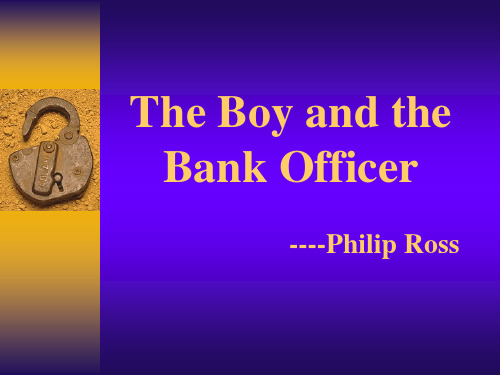
5. withdraw:
v. a. to take money out of a bank account eg: Liz withdrew $100 from her account. b. move back or away from a place eg: The American troops were forced to withdraw from Iraq.
The Boy and the Bank Officer
----Philip Ross
Philip Ross (1939- )
An American freelance writer
Write for: The New Yorker
Reader’s Digest The New York Times This text is taken from Strategies for Successful Writing
General introduction
Plot: a boy’s withdrawal of money from
the bank
Setting: in a bank
Protagonists:
bank officer, the boy and “I”
Structure
1
The unfavorable opinion of the narrator’s friend on banks : They act like churches. (P1)
The Boy and the Bank Officer
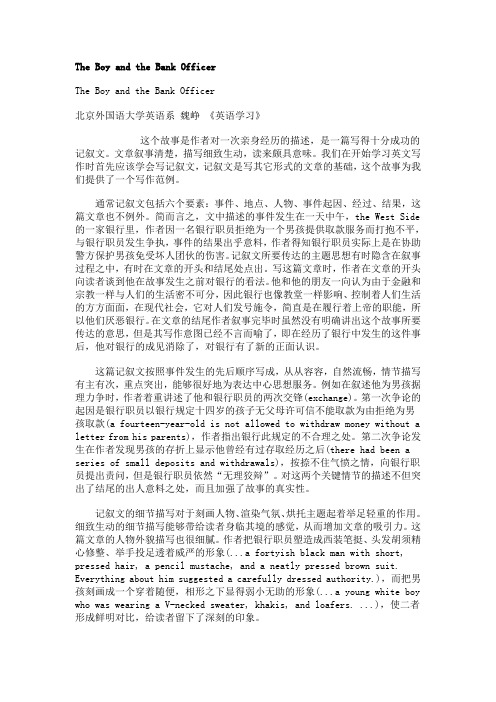
The Boy and the Bank OfficerThe Boy and the Bank Officer北京外国语大学英语系魏峥《英语学习》这个故事是作者对一次亲身经历的描述,是一篇写得十分成功的记叙文。
文章叙事清楚,描写细致生动,读来颇具意味。
我们在开始学习英文写作时首先应该学会写记叙文,记叙文是写其它形式的文章的基础,这个故事为我们提供了一个写作范例。
通常记叙文包括六个要素:事件、地点、人物、事件起因、经过、结果,这篇文章也不例外。
简而言之,文中描述的事件发生在一天中午,the West Side 的一家银行里,作者因一名银行职员拒绝为一个男孩提供取款服务而打抱不平,与银行职员发生争执,事件的结果出乎意料,作者得知银行职员实际上是在协助警方保护男孩免受坏人团伙的伤害。
记叙文所要传达的主题思想有时隐含在叙事过程之中,有时在文章的开头和结尾处点出。
写这篇文章时,作者在文章的开头向读者谈到他在故事发生之前对银行的看法。
他和他的朋友一向认为由于金融和宗教一样与人们的生活密不可分,因此银行也像教堂一样影响、控制着人们生活的方方面面,在现代社会,它对人们发号施令,简直是在履行着上帝的职能,所以他们厌恶银行。
在文章的结尾作者叙事完毕时虽然没有明确讲出这个故事所要传达的意思,但是其写作意图已经不言而喻了,即在经历了银行中发生的这件事后,他对银行的成见消除了,对银行有了新的正面认识。
这篇记叙文按照事件发生的先后顺序写成,从从容容,自然流畅,情节描写有主有次,重点突出,能够很好地为表达中心思想服务。
例如在叙述他为男孩据理力争时,作者着重讲述了他和银行职员的两次交锋(exchange)。
第一次争论的起因是银行职员以银行规定十四岁的孩子无父母许可信不能取款为由拒绝为男孩取款(a fourteen-year-old is not allowed to withdraw money without a letter from his parents),作者指出银行此规定的不合理之处。
最新Unit-Four-The-boy-and-the-bank-officer-教案资料
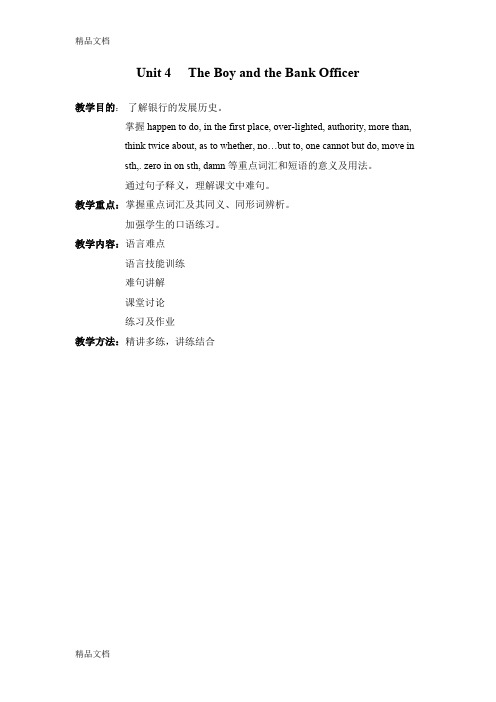
教学目的:了解银行的发展历史。
掌握happen to do, in the first place, over-lighted, authority, more than,think twice about, as to whether, no…but to, one cannot but do, move insth,. zero in on sth, damn等重点词汇和短语的意义及用法。
通过句子释义,理解课文中难句。
教学重点:掌握重点词汇及其同义、同形词辨析。
加强学生的口语练习。
教学内容:语言难点语言技能训练难句讲解课堂讨论练习及作业教学方法:精讲多练,讲练结合Questions for Pre-class reading:1.How do you understand the author’s friend’s attitude toward banks?He hates the bank.A banker is a man who lends you un umbrella when the weather is fair and takes it away from you when it rains.2. What can banks do for us? And what about churches?Keep your money.Churches represent God, give people moral advices and preach moral lessons, tell people what to do and what not to do.3. Why did the author go to bank one day?To open a checking account.4. What did he see in the bank?A school boy tried to withdraw money from the bank.5. Why did the officer refuse to have the boy withdraw money?A fourteen-year-old is not able to withdraw money without a letter from his parents.6. What did the author do then?He thought the bank policy is very ridiculous. He thought what he saw confirmed his friend’s comment on banks. He decided not to open his account and found it a good chance to attack the bank policy.7. What do you think of the ending of the story? What effect may it bring to the story? The exaggeration of the speaker’s anger and determination to attack produces comic(喜剧的;逗人的;幽默的) effect.Appreciation of the text:Plot: a boy’s withdrawal of money from bankSetting: at the bankMain characters: the bank officer, the boy, “I”Theme: traditionally, poor people and people who sympathize them regard bank as evil, or as enemy of the poor. Such suspicions and misgivings still linger on. This article seems to prove that prejudices of people like the author are ungrounded. Structure of the text:Part Ⅰ( para.1) : the attitude of the author’s friend toward the bank.PartⅡ( paras. 2-23): the boy managed to withdraw money from the bank but was kindly refused.Part Ⅲ( paras.24-32): the bank officer cleared the fact.Language Points▲happen to do: occur by chance, take placeShe happened to be out when he called yesterday.When the fire broke out, I happened to be passing by.She happened to be out when he called.I happen to know sth about medicine, so he couldn’t fool me.happen: ---refer to accidental or unplanned eventoccur: ---refer to accidental or unplanned event; more formal than happentake place: suggest that an event is/was planned▲in the first / second…place: ---firstly / secondly…in my / your… place: ---in my situation or circumstances▲. overlighted: --- having too much lightover-: 1)above; outside; acrossovercoat overhead overhang overall2) to excess; too muchovertime overeat over-rich overburdenovercharge overweight overstaffed overwhelm▲fortyish: at about the age of forty-ish: a).. reddish greenish bluish yellowish darkish brownishb). foolish childish babyish boyish womanish snobbishclownishc). English Irish Polish Scottish Finnish SpanishSwedishd). selfish bookishe). fiftyish fortyishf). publish polish punish accomplish abolish astonish establish▲mustache: hair on upper lipbeard: hair growing on man’s chingoatee: short pointed beard▲authority: 1) powers to give orders and make others obey The leader must be a person of authority.2) person or group having the power to give orders or take actionsThe health authority is investigating the matter.3) person with special knowledgeShe is an authority on phonetics.▲more than (para. 4): (colloq.) very; extremely; beyondThey were more than willing to help.Some of the stories were really more than could be believed.more… than…:The child was more frightened than hurt.He always seemed old to me, more like a grandfather than a father.no more than: 1)only; justIt cost me only $5 to buy the book.Before long her white sails were no more than a speck upon the waters.2) the same asHe’s no more able to read Spanish than I am.▲w ear an expression of open disma y (para. 5)She look at her plate with an expression of disgust.▲Hold one’s attentionHe is able to hold the audience’s attention even before he speaks.他甚至能在开口之前就吸引住观众的注意。
The Boy and the Bank Office
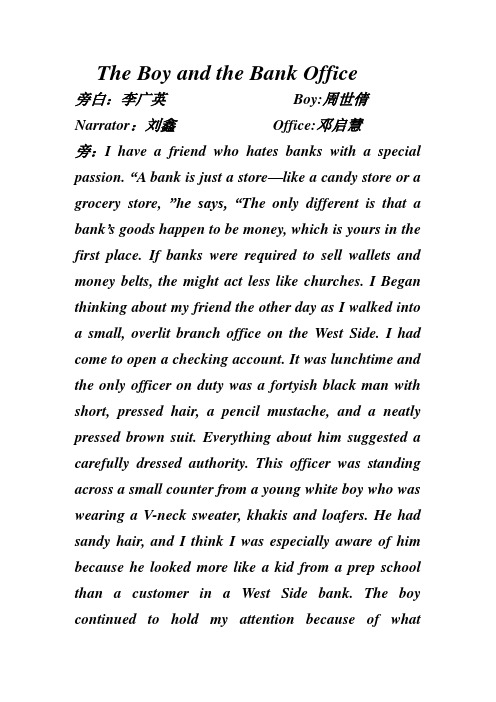
The Boy and the Bank Office旁白:李广英Boy:周世倩Narrator:刘鑫Office:邓启慧旁:I have a friend who hates banks with a special passion. ―A bank is just a store—like a candy store or a grocery store, ‖he says, ―The only different is that a bank‘s goods happen to be money, which is yours in the first place. If banks were required to sell wallets and money belts, the might act less like churches. I Began thinking about my friend the other day as I walked into a small, overlit branch office on the West Side. I had come to open a checking account. It was lunchtime and the only officer on duty was a fortyish black man with short, pressed hair, a pencil mustache, and a neatly pressed brown suit. Everything about him suggested a carefully dressed authority. This officer was standing across a small counter from a young white boy who was wearing a V-neck sweater, khakis and loafers. He had sandy hair, and I think I was especially aware of him because he looked more like a kid from a prep school than a customer in a West Side bank. The boy continued to hold my attention because of whathappened next.B: I don‘t understand that I opened the account, but why I can‘t withdraw any money?O: I‗ve already explained to you that a fourteen-year –old boy is not allowed to withdraw money from his parent.B: But that doesn‘t seem fair, it‘s my money. I put it in. It‘s my account.O: I know it is, but those are rules. Now if you‘ll excuse me.(转过去对着N说) May I help you ,sir?N: I was going to open a new account, but after seeing what‘s going on here, I think I‘ve my mind.O: Excuse me?N: Look! If I understand what‘s going on here correctly, what you are saying is that this boy is old enough todeposit his money in your bank but he‘s not old enough to withdraw it. And since there doesn‘t to be seem to be any question as to whether it‘s his money or his account, the bank‘s so-called policy is really ridiculous.O: It may seem ridiculous to you, but it‘s the bank‘s policy and I have no other alternative but to follow the rules.旁:The boy had stood hopefully to me during this exchange, but now I was just as hopeless. Suddenly I noticed that the open savings book he continued to grasp showed a balance of 100 dollars. It also show that there had been a series of small deposits and withdraws.I had my opening.N: Have you withdrawn money before by yourself?B: Yes.N: How do you explain that? Why did you let himwithdraw money before, but not now!O: Because the tellers were aware of his age and now they are. It‘s very simple.N:(转向小男孩并耸肩) You‘re really getting cheated, you ought to get your parents to come in here and protest.O: You know? You are really shouldn‘t have interfered.N: Shouldn‘t have interfered? Well, it damn well seemed to me that he needed someone to represent his interests.O: Someone was representing his interests.N: And who might that be?O: The bank.N: Look. We‘re just wasting each other‘s time. But maybe you‘d like to explain exactly how the bank wasrepresenting that boy‘s interests?O: Certainly, we were informed this morning that some neighborhood bully has been shaking this boy down for more than a month. But other guy was forcing him to take money out every week and hand it over. The poor kid was apparently too scared to tell anyone. That‘s the real reason he was so upset. He was so upset .He was afraid of what the other guy would do to him. Anyway, the police are on the case and they‘ll probably make an arrest today.N: You there is no rule about being too young to withdraw money from a savings account.O: Not that I had ever heard of. Now, sir, what can we do for you?。
The Boy and the Bank Officer解读
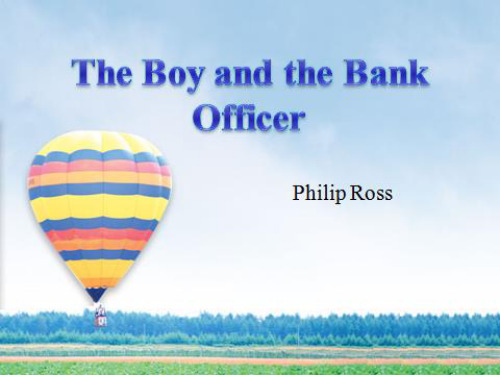
English names for banks in china:
中国银行 Bank of China 中国人民银行 The People's Bank of China 中国工商银行 Industrial and Commercial Bank of China 中国农业银行 Agricultural Bank of China 中国建设银行 China Construction Bank 中国邮政储蓄银行 Postal Savings Bank of China 中国农业发展银行 Agricultural Development Bank of China 中国光大银行 China Everbright Bank 中国民生银行 China Minsheng Banking Corp.,LTD 中国中信银行 China Citic Bank 中国招商(商业)银行 China Merchants Bank
How do you feel about Bank?
• 中国建设银行(CCB):存存不? = China Construction Bank • 中国银行(BC):不存! (BOC: 别零存!) = Bank of China • 中国农业银行(ABC):啊, 不存! • 中国工商银行(ICBC):爱存不存! Bank of China • 民生银行(CMSB):存么?傻B! • 招行(CMBC):存么?白痴! • 兴业银行(CIB):存一百 • 国家开发银行(CDB):存点吧! • 汇丰银行(HSBC):还是不存! Shanghai Banking Corporation = Agricultural Bank of China = Industrial and Commercial = China Minsheng Bank = China Merchants Bank = China Industrial Bank = China Development Bank = The HongKong and
The Boy and the Bank Officer
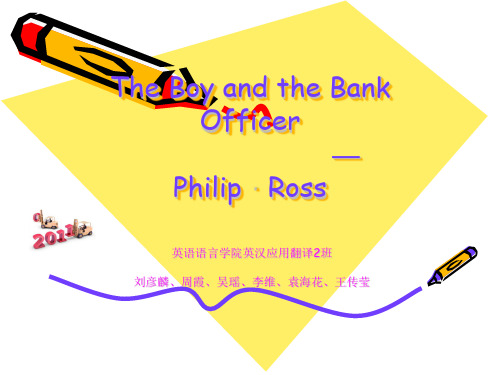
6.“But
Thanks! Bye!
5.…a
fourteen-year-old is not allowed to withdraw money without a letter from his parents. a-14-year-old: someone who is 14 years old. 使用这种形式时要注意,中间的名词要用单数,并且, 这种形式表示“adj.”。
• *press
n. 报刊,杂志(the press),记者 verb. 推、挤,劝说,要求,弄平 pressed brown suit: make cloths smooth using a hot iron. fortyish: about forty
3. Every thing about him suggested a carefully dressed authority. to suggest sth./that : to put sth. in sb’ s mind 使人想到 e.g. His name suggests that he was born in an Italian family. suggest sb to do sth suggest that sb should do sth
• 2. …the only officer on duty was a fortyish black man with short, pressed hair, a pencil mustache, and a neatly pressed brown suit. Pressed hair: make the hair uncurled. “”pressed 是过去分词作定语,修饰”hair”,意 思是把卷曲的头发拉直
现代大学英语精读_the_boy_and_bank_officer
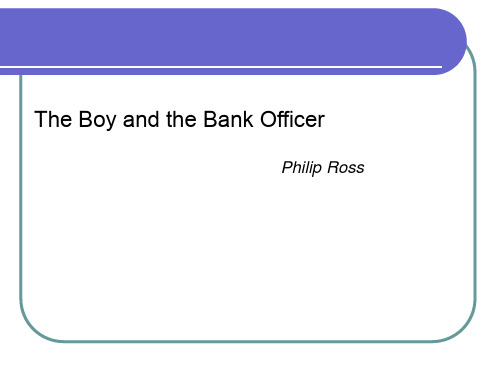
overuse
使用过度
overdrink
饮酒过甚
overeat
吃得过多
overharge
索价太高
over- (2): above; across;
beyond
overbridge 跨线桥;天桥
overcoat
外套;外衣
overshoe
套鞋
1.开户头 2. 结清账户
3.存款
4. 提款
5.透支 6. 节余
7.信用卡 8. 存折
9.银行卡 10. 存折
11.定期存款 12.活期存款
13.银行职员 14.银行出纳
15.自动提款机
12. a checking/current account 14. bank teller
15. A.T.M. (automatic teller machine)
Clerk: Please sign your name on the back of the check. All right. Here’s your passbook and your pass card. This passbook is for your own record. Bring the pass card with you every time you come to deposit or withdraw money. It also allows you to bank by computer during non-banking hours.
Philip Ross (1939— ) is an American writer based in New York. After working as a newspaper reporter for four years, he turned to freelance (自由职业作家) writing. Many of his articles have appeared in the New Yorker (《纽约人》), Reader’s Digest (《读者文摘》) and New York Times (《纽约时 报》). This text is taken from Strategies for Successful Writing: A Rhetoric and Reader, 3rd edition published by Prentice Hall, Inc. in 1993 in Englewood Cliffs, New Jersey.
现代大学英语精读1题目答案
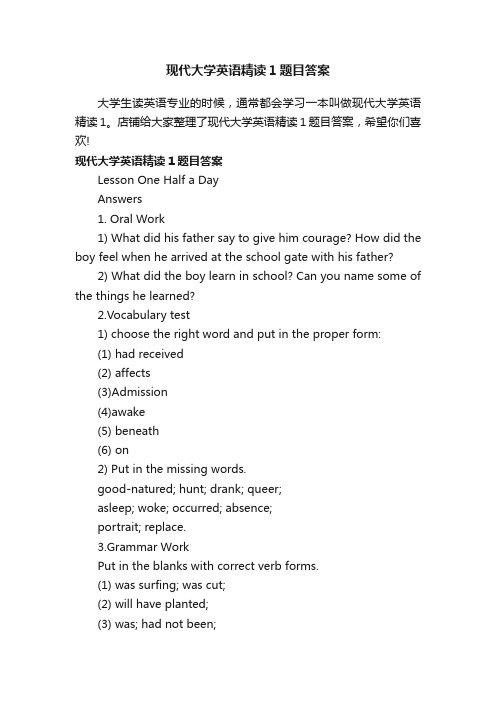
现代大学英语精读1题目答案大学生读英语专业的时候,通常都会学习一本叫做现代大学英语精读1。
店铺给大家整理了现代大学英语精读1题目答案,希望你们喜欢!现代大学英语精读1题目答案Lesson One Half a DayAnswers1. Oral Work1) What did his father say to give him courage? How did the boy feel when he arrived at the school gate with his father?2) What did the boy learn in school? Can you name some of the things he learned?2.Vocabulary test1) choose the right word and put in the proper form:(1) had received(2) affects(3)Admission(4)awake(5) beneath(6) on2) Put in the missing words.good-natured; hunt; drank; queer;asleep; woke; occurred; absence;portrait; replace.3.Grammar WorkPut in the blanks with correct verb forms.(1) was surfing; was cut;(2) will have planted;(3) was; had not been;(4) has been married;(5) is; will be;(6) is; must have rained4.Written WorkWrite what you’ve learnt from the text about the little boy’s life in school in about 100 words.5. Translation(1)也许所有教育最有价值的结果就是培养你有具有让你完成你不得不做的任何该做的事,不管你愿不愿意做.(2)教育就是能让我们不断地发现我们的无知.Lesson Two Going HomeAnswers1. Oral work(1) What do you know about these young people?(2) How did the young people feel when they heard the story ?2. Vocabulary test1) choose the right word and put in the proper form:(1) across(2) rise(3) attend/ take part in(4) reach(5) since(6) above/ below2) Put in the missing words.screaming; clenched; triumph; exaltation; except; stunned; misty; covered; ribbons; banner3.Grammar workTranslation.(1) Nobody could tell where the treasure was hidden.(2) The traffic will be very heavy on the road during the rushhour everyday.(3) He may have given her advice, but I doubt if it does her any good.(4) What she learned at university proved useful in her research .(5) If he had waited for the traffic lights to change, he would not have been killed.(6) If not I had seen him at the party yesterday evening !4. Written Work略.5. Translation(1)多给人原谅比多去谴责(2)如果我们想要去爱,我们必须学会如何去原谅.Lesson Three Massage of the LandAnswers1. Oral work (answers omitted)2. Vocabulary test1)(1) unfaithful (2) take out(3) talk over (4) send for(5) sent away (6) send up2) Put the missing words(1) sick / ill (2) alone (3) out (4) phone (5) on(6) until (7) church (8) only (9) answered (10) needed(11) clever (12) save (13) bit (14) now3) Write the numbers in words.(1) Two hundred and eight(2) One thousand five hundred / fifteen hundred(3) Seven thousand, one hundred and twenty-eight.(4) two dollars six-five / two dollars and sixty-five cents.(5) fourth(6) twenty-first(7) thirtieth(8) one half, three quarters, four fifths3.Grammar work (answers omitted)4. Written WorkOne possible version:My parents were born, brought up and married on this land. They have been living there through their life. They got up at sunrise and retired with their chickens. They planted and reaped rice and raised a few goats, cows and chickens which could provide what they needed in their daily life.. However, the piece of lands was no longer fertile, bleeding year after year, like them, getting old and exhausted. The soil was not difficult to till when there was a lot of rain, but in a bad year, it was not only the ploughs that broke but their hearts, too. The farmer life is hard but my parents are enjoying it. They cherish their land and never want to leave it.5. Translation.1) 家再贫寒,也没有任何地方能和它比。
现代大学英语精读第一册课后答案
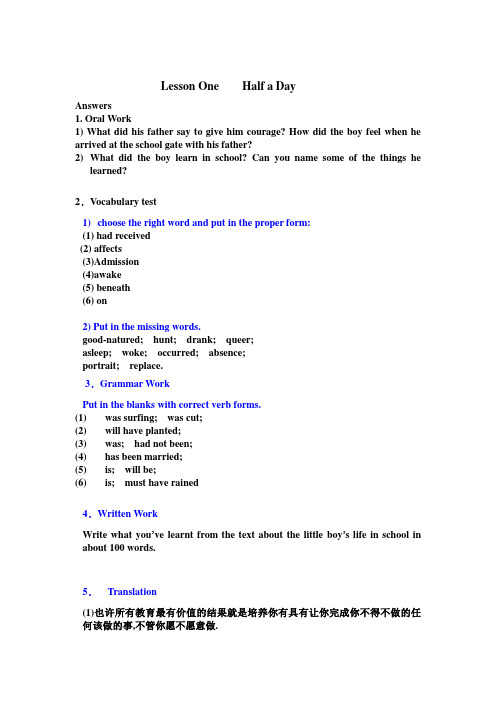
Lesson One Half a DayAnswers1. Oral Work1) What did his father say to give him courage? How did the boy feel when he arrived at the school gate with his father?2)What did the boy learn in school? Can you name some of the things helearned?2.Vocabulary test1)choose the right word and put in the proper form:(1) had received(2) affects(3)Admission(4)awake(5) beneath(6) on2) Put in the missing words.good-natured; hunt; drank; queer;asleep; woke; occurred; absence;portrait; replace.3.Grammar WorkPut in the blanks with correct verb forms.(1)was surfing; was cut;(2)will have planted;(3)was; had not been;(4)has been married;(5)is; will be;(6)is; must have rained4.Written WorkWrite what you’ve learnt from the text about the little boy’s life in school in about 100 words.5.Translation(1)也许所有教育最有价值的结果就是培养你有具有让你完成你不得不做的任何该做的事,不管你愿不愿意做.(2)教育就是能让我们不断地发现我们的无知.Lesson Two Going HomeAnswers2.Oral work(1)What do you know about these young people?(2)How did the young people feel when they heard the story ?3.Vocabulary test2)choose the right word and put in the proper form:a)acrossb)risec)attend/ take part ind)reache)sincef)above/ below2) Put in the missing words.screaming; clenched; triumph; exaltation; except; stunned; misty; covered; ribbons; banner3.Grammar workTranslation.(1)Nobody could tell where the treasure was hidden.(2)The traffic will be very heavy on the road during the rush hour everyday.(3)He may have given her advice, but I doubt if it does her any good.(4)What she learned at university proved useful in her research .(5)If he had waited for the traffic lights to change, he would not have beenkilled.(6)If not I had seen him at the party yesterday evening !4. Written Work略.5. Translation(1)多给人原谅比多去谴责(2)如果我们想要去爱,我们必须学会如何去原谅.Lesson Three Massage of the LandAnswers1.Oral work (answers omitted)2. Vocabulary test1)(1) unfaithful (2) take out(3) talk over (4) send for(5) sent away (6) send up2) Put the missing words(1) sick / ill (2) alone (3) out (4) phone (5) on(6) until (7) church (8) only (9) answered (10) needed(11) clever (12) save (13) bit (14) now3) Write the numbers in words.(1) Two hundred and eight(2) One thousand five hundred / fifteen hundred(3) Seven thousand, one hundred and twenty-eight.(4) two dollars six-five / two dollars and sixty-five cents.(5) fourth(6) twenty-first(7) thirtieth(8) one half, three quarters, four fifths3.Grammar work (answers omitted)4. Written WorkOne possible version:My parents were born, brought up and married on this land. They have been living there through their life. They got up at sunrise and retired with their chickens. They planted and reaped rice and raised a few goats, cows and chickens which could provide what they needed in their daily life.. However, the piece of lands was no longer fertile, bleeding year after year, like them, getting old and exhausted. The soil was not difficult to till when there was a lot of rain, but in a bad year, it was not only the ploughs that broke but their hearts, too. The farmer life is hard but my parents are enjoying it. They cherish their land and never want to leave it.5. Translation.1) 家再贫寒,也没有任何地方能和它比。
Unit2 The Boy and the Bank Officer

《综合英语1》
教案
授课班级:2018级2、3班
授课专业:外国语言文学类
授课学年学期:2018-2019学年上期教师姓名:白美娴
教务处评估处2017年12月制
说明:
1.一次课应备一个教案,每个教案根据实际情况在“课时”一栏中选择相应课时;2.教学目标包括:专业知识、专业能力、基本素养、职业素养、创新创业素养等;3.教学过程(设计)包括:(1)教学任务分配:教师讲授内容(含学科前沿知识)、学生自学内容、教师指导内容;(2)教学过程:复习导入、新课讲授、小结和教学反思;4.作为本课程的第一个教案,“参考教材、参考书目、参考文献”据实填写,以后教案视情况填写或填写“同前”。
unit 4-The Boy and the Bank Officer(I)
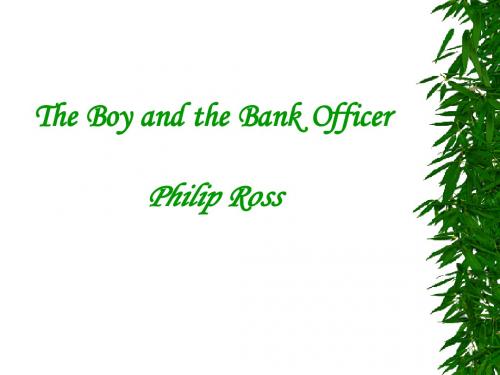
Background: Background: Banks
Banks of the 17th century also began to issue bank notes as a form of money. The notes had monetary value because they could be exchanged for specie: hard cash in the form of gold or silver. The amounts of the bank notes issued depended on a banker's expectation of public demand for specie and the bank's confidence in itself. Bank notes were probably first issued in the 1660s by the Bank of Stockholm in Sweden; the practice soon spread to England. The Bank of France was founded in 1800. For most of the 19th century the money markets of Europe were dominated by the House of Rothschild.
Italian Banking in the 14th Century
Background: Background: Banks
HISTORY OF BANKS Functions performed by banks today have been carried out by individuals, families, or state officials for at least 4,000 years. Clay tablets dated from about 2000 BC indicate that the Babylonians deposited personal valuables for a service charge of one 60th of their worth. Interest charges on loans ran as high as one third. The widespread commerce of Rome required a well-developed banking system. Roman authorities set aside the Street of Janus in the Forum for money changers. These individuals not only bought and sold foreign coins; they accepted deposits, made loans, issued bills of exchange and bills of credit (similar to today's checks), and bought mortgages.
The_Boy_and_the_Bank_Officer综合英语1_课文原文
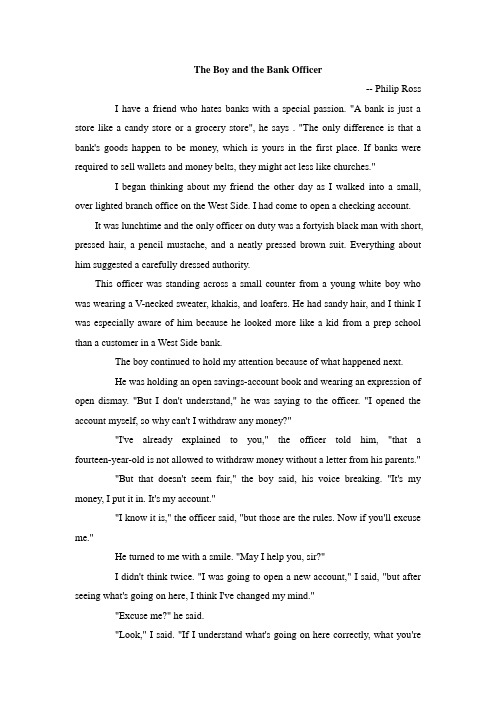
The Boy and the Bank Officer-- Philip RossI have a friend who hates banks with a special passion. "A bank is just a store like a candy store or a grocery store", he says . "The only difference is that a bank's goods happen to be money, which is yours in the first place. If banks were required to sell wallets and money belts, they might act less like churches."I began thinking about my friend the other day as I walked into a small, over lighted branch office on the West Side. I had come to open a checking account.It was lunchtime and the only officer on duty was a fortyish black man with short, pressed hair, a pencil mustache, and a neatly pressed brown suit. Everything about him suggested a carefully dressed authority.This officer was standing across a small counter from a young white boy who was wearing a V-necked sweater, khakis, and loafers. He had sandy hair, and I think I was especially aware of him because he looked more like a kid from a prep school than a customer in a West Side bank.The boy continued to hold my attention because of what happened next.He was holding an open savings-account book and wearing an expression of open dismay. "But I don't understand," he was saying to the officer. "I opened the account myself, so why can't I withdraw any money?""I've already explained to you," the officer told him, "that a fourteen-year-old is not allowed to withdraw money without a letter from his parents.""But that doesn't seem fair," the boy said, his voice breaking. "It's my money, I put it in. It's my account.""I know it is," the officer said, "but those are the rules. Now if you'll excuse me."He turned to me with a smile. "May I help you, sir?"I didn't think twice. "I was going to open a new account," I said, "but after seeing what's going on here, I think I've changed my mind.""Excuse me?" he said."Look," I said. "If I understand what's going on here correctly, what you'resaying is that this boy is old enough to deposit his money in your bank but he's not old enough to withdraw it. And since there doesn't seem to be any question as to whether it's his money or his account, the bank's so-called policy is clearly ridiculous.""It may seem ridiculous to you," he replied in a voice rising slightly in irritation, "but that is the bank's policy and I have no other choice but to follow the rules".The boy had stood hopefully next to me during this exchange, but now I was just as helpless. Suddenly I noticed that the open savings book he continued to grasp showed a balance of about $100. It also showed that there had been a series of small deposits and withdrawals.I had my opening."Have you withdrawn money before by yourself?" I asked the boy."Yes," he said.I moved in for the kill."How do you explain that?" I zeroed in on the officer. "Why did you let him withdraw money before, but not now?"He looked annoyed. "Because the tellers were not aware of his age before and now they are. It's really very simple".I turned to the boy with a shrug. "You're really getting cheated," I said. "You ought to get your parents to come in here and protest."The boy looked destroyed. Silently, he put his savings book in a rear-pocket and walked out of the bank.The officer turned to me. "You know," he said, "you really shouldn't have interfered.""Shouldn't have interfered?" I shouted. "Well, it damn well seemed to me that he needed someone to represent his interests.""Someone was representing his interests," he said softly."And who might that be?""The bank."I couldn't believe what this idiot was saying. "Look," I concluded, "we're justwasting each other's time. But maybe you'd like to explain exactly how the bank was representing that boy's interests?""Certainly," he said. "We were informed this morning that some neighborhood bully has been shaking this boy down for more than a month. The other guy was forcing him to take money out every week and hand it over. The poor kid was apparently too scared to tell anyone. That's the real reason he was so upset. He was afraid of what the other guy would do to him. Anyway, the police are on the case and they'll probably make an arrest today.""You mean there is no rule about being too young to withdraw money from a savings account?""Not that I ever heard of. Now, sir, what can we do for you?"Glossary:AlternativeApparentlyBranchBullyConcludeDamnDismayFortyishHelpless HopefullyIdiot savings teller shrugInterfereIrritationLoafer Mustache Neatly passion sandy series shake slightly OverlitProtest rearWithdrawal。
现代大学英语精读_the boy and bank officer

overfly
飞越
oversea(s) 海外的
overleap
跳过
overlook
俯视
over- (3): upset
overturn
overthrow
倾覆,倾倒 推翻
overset
翻转;翻倒
I. Words & Expressions
1.开户头 3.存款
2. 结清账户 4. 提款
I. Text Analysis
Structure of the text
Part 1 (para. 1) about: The attitude of the author’s friend toward bank.
Part 2 (paras. 2—23) about:The boy managed to withdraw money from the bank but was kindly refused.
Philip Ross (1939— ) is an American writer based in New York. After working as a newspaper reporter for four years, he turned to freelance (自由职业作家) writing. Many of his articles have appeared in the New Yorker (《纽约人》), Reader’s Digest (《读者文摘》) and New York Times (《纽约时 报》). This text is taken from Strategies for Successful Writing: A Rhetoric and Reader, 3rd edition published by Prentice Hall, Inc. in 1993 in Englewood Cliffs, New Jersey.
精读1翻译及课文背诵
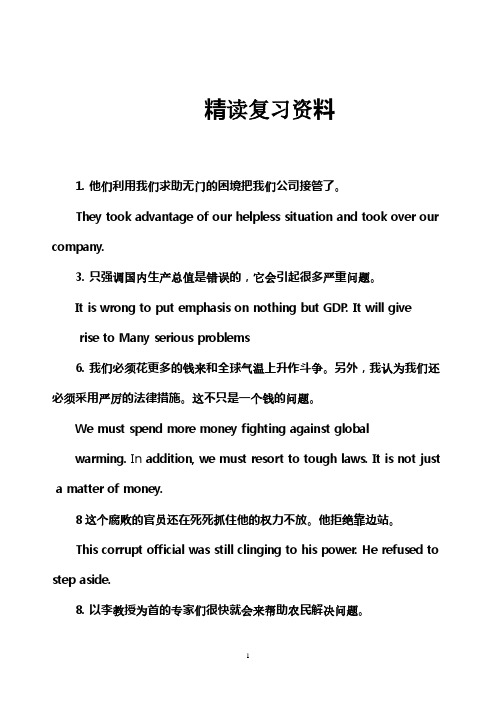
精读复习资料1. 他们利用我们求助无门的困境把我们公司接管了。
They took advantage of our helpless situation and took over our company.3. 只强调国内生产总值是错误的,它会引起很多严重问题。
It is wrong to put emphasis on nothing but GDP. It will giverise to Many serious problems6. 我们必须花更多的钱来和全球气温上升作斗争。
另外,我认为我们还必须采用严厉的法律措施。
这不只是一个钱的问题。
We must spend more money fighting against globalwarming. In addition, we must resort to tough laws. It is not just a matter of money.8这个腐败的官员还在死死抓住他的权力不放。
他拒绝靠边站。
This corrupt official was still clinging to his power. He refused to step aside.8. 以李教授为首的专家们很快就会来帮助农民解决问题。
A team of experts headed by Professor Li will soon come andhelp farmers solve their problems.6他们继续争吵了几个钟头,两人似乎谁也不愿听对方的话。
我突然想起有人说过:“讨论是知识的交流,而争吵是无知的交换。
”They went on arguing for hours. Neither was willing to listen to the other. I suddenly remembered someone saying: Discussion is an exchange ofknowledge while argument is an exchange ofignorance.7. 那里的形式似乎非常复杂,政府已答应进行认真调查。
现代大学英语B1U2课后练习参考答案TheBoyandtheBankOfficer

Unit 2Vocabulary1.Become familiar with the rules of word formation1.Give the parts of speech of the following words and guess the meaning.1. n2. n.3. v past participle4. v past participle5. v past participle6. n7. n8. n9. adj10. adj11. n12. n13. adv14. adv15. adj.16. adj17. n18. n19. n20.n2. Guess the meaning of the following words and see how they are formed. 1. 头痛 2. 钞票3. 祖国4. 伤心5. 握手6.山体滑坡7. 月光8. 雪地靴9. 手册 10. 店员11.夜总会 12. 交叉火力 13. 意志力3. Translate the following expressions, paying attention to the different use of the suffix"-y"1.繁星密布的夜空2.狂风暴雨肆虐的大海3.棉花般的雪4.多山地区5.落基山脉6.肉嘟嘟的鼻子7.多毛的胸毛8.浓密的眉毛9.卷曲的头发10.有钱人11.雨季12.银发13.红润的面颊14.多刺的鱼15.瘦骨嶙峋的女孩儿 16. 气味难闻的奶酪17. 咸味食品18. 华而不实的语言4.Translate the following sentences, paying special attention to the words in bold type.1.一个男子突然站了起来,用他的鞋子朝他扔过去。
幸亏他及时低头躲了过去。
- 1、下载文档前请自行甄别文档内容的完整性,平台不提供额外的编辑、内容补充、找答案等附加服务。
- 2、"仅部分预览"的文档,不可在线预览部分如存在完整性等问题,可反馈申请退款(可完整预览的文档不适用该条件!)。
- 3、如文档侵犯您的权益,请联系客服反馈,我们会尽快为您处理(人工客服工作时间:9:00-18:30)。
Part 3 (paras. 24—32) about:
Text Analysis
Further discussion about the story
1. The only difference is that a bank’s goods happen to be money, which is yours in the first place. (para1) to happen to do/to be: to do/to be sth. by chance e.g. 发生火灾时,我刚好路过。 I happened to be passing by, when the fire broke out. in the first place If you don’t like the dress, you shouldn’t have bought it in the first place.
• buying rate 买进价格 selling rate 卖出价格 exchange table, conversion table 汇兑换算表 foreign exchange 外汇 exchange rate 外汇率 conversion rate 折合率 foreign exchange restriction 外汇限额 foreign exchange quotations 外汇行情
Text Analysis
Structure of the text
Part 1 (para. 1) about:
The attitude of the author’s friend toward bank.
The failure of the boy’s attempt to withdraw money from the bank and the author’s fruitless interference The bank officer’s clarification of the situation
Text Analysis
…which is yours in the first place. 我首先是一个教师,其次才是一个作家。
I am a teacher in the first place and a writer in the next place.
你为什么不先告诉我一下?
Why didn't you tell me in the first place?
Talk about the English translation of the following banks name with your partner
中国银行 中国人民银行 中国工商银行 中国农业银行 中国建设银行 中国邮政储蓄银行 中国农业发展银行 中国光大银行 中国民生银行 中国中信银行 中国招商(商业)银行
• drawing-out slip 取款单 the number slip 号码牌 a withdrawal form 取款单 to fill in the receipt in duplicate 一式两份填这张收据 teller, cashier 出纳 account number 帐目编号 depositor 存户 pay-in slip 存款单 a deposit form 存款单 a banding machine 自动存取机 deposit 存款 deposit receipt 存款收据 private deposits 私人存款 certificate of deposit 存单 deposit book, passbook 存折
How do you feel about Bank?
• 中国建设银行(CCB):存存不? = China Construction Bank • 中国银行(BC):不存! (BOC: 别零存!) = Bank of China • 中国农业银行(ABC):啊, 不存! • 中国工商银行(ICBC):爱存不存! Bank of China • 民生银行(CMSB):存么?傻B! • 招行(CMBC):存么?白痴! • 兴业银行(CIB):存一百 • 国家开发银行(CDB):存点吧! • 汇丰银行(HSBC):还是不存! Shanghai Banking Corporation = Agricultural Bank of China = Industrial and Commercial = China Minsheng Bank = China Merchants Bank = China Industrial Bank = China Development Bank = The HongKong and
Author
About the Author
Philip Ross (1939— ) is an American writer based in New York. After working as a newspaper reporter for four years, he turned to freelance (自由职业作家) writing. Many of his articles have appeared in the New Yorker (《纽约 人》), Reader’s Digest (《读者文摘》) and New York Times (《纽约时报》). This text is taken from Strategies for Successful Writing: A Rhetoric and Reader, 3rd edition published by Prentice Hall, Inc. in 1993 in Englewood Cliffs, New Jersey.
English names for banks in china:
中国银行 Bank of China 中国人民银行 The People's Bank of China 中国工商银行 Industrial and Commercial Bank of China 中国农业银行 Agricultural Bank of China 中国建设银行 China Construction Bank 中国邮政储蓄银行 Postal Savings Bank of China 中国农业发展银行 Agricultural Development Bank of China 中国光大银行 China Everbright Bank 中国民生银行 China Minsheng Banking Corp.,LTD 中国中信银行 China Citic Bank 中国招商(商业)银行 China Merchants Bank
Useful vocabulary of banking:
• open an account 开个帐户 • close an account 关闭帐户 • pay/settle one’s account 付/结帐 • savings account 储蓄帐户 • deposit account 定期存款帐户 • checking/current account 活期存款帐户 • savings bank 储蓄银行 • savings account book 储蓄帐户存折
• Question : Why does the author say that the money “is yours in the first place”? • Because at the beginning the money belongs to you, and then you deposit the money in a bank, the tangible(有形的) money becoming a intangible figure on the bankbook.
deposit money in the bank 存钱 withdraw money from the bank 取钱 balance 结余 interest 利息 rate of interest 利息率 exchange rate 外汇兑换率 denomination 面额 ATM –automated teller machine 自动取款(出纳)机
2. Para: If banks were required to sell wallets and money belts, they might act less like churches. (para. 1)
Unreal condition and subjunctive mood The word “church” has certain associations. People usually think of a church as the spokesman of God, as a powerful organization that controls your life and can interfere in your life. To be like churches means to act authoritatively.
Paraphrasing: Even though banks sell financial service instead of common goods, they are still business organizations instead of churches. Thus it is ridiculous for them to act like churches by acting authoritatively and interfering in other people’s lives instead of focusing on their function and position as a business organization.
